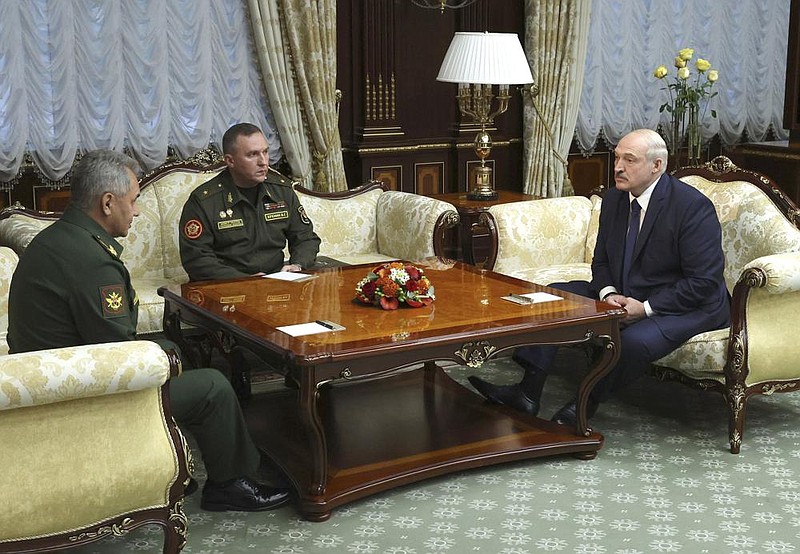MOSCOW -- Belarus' authoritarian leader on Wednesday sought to disparage protesters demanding his resignation for a sixth-straight week after a disputed election by accusing the United States of fomenting the unrest.
In a long speech to top officials, Belarusian President Alexander Lukashenko ranted against the alleged U.S.-led plan to destabilize the country and claimed that American allies in Europe have participated in the effort that took years to prepare, part of his attempts to cast the opposition as Western stooges.
Lukashenko didn't provide evidence to back his claim that the U.S. had any involvement in the demonstrations.
His main challenger in the election, Sviatlana Tsikhanouskaya, dismissed his comments as an attempt to divert public attention from rigging the vote and the violent crackdown on protests.
"There is just one reason behind the protests in Belarus and it's known to everyone: Lukashenko has lost the vote, but he doesn't want to step down," Tsikhanouskaya told The Associated Press in a written comment. "People have denied Lukashenko their trust and support and demand that he leave."
Protesters in Belarus have flooded the streets of the capital and other cities, denouncing Lukashenko's landslide reelection in the Aug. 9 vote as rigged. The demonstrations were driven by frustration with the Belarusian strongman's 26-year iron-fist rule, his response to the coronavirus and the worsening economy.
The U.S. and the European Union have criticized the election as neither free nor fair, and urged Lukashenko to start talks with the opposition -- a call he has rejected.
"We had the vote and got the result, period," Lukashenko said in Wednesday's speech before top officials. "It's time to stop stirring up society."
Sergei Naryshkin, director of Russia's Foreign Intelligence Service, claimed in a statement carried by Russian news agencies Wednesday that the U.S. has funded the Belarusian opposition and encouraged the protests.
In an apparent attempt to delegitimize the Belarusian protests, Naryshkin added that his agency has information that "the U.S. is playing a key role in the current developments in Belarus." He alleged that the U.S. has earmarked tens of millions of dollars to finance Belarus' opposition groups, but provided no evidence.
The U.S. Embassy in Minsk had no immediate comment.
Tsikhanouskaya, the main opposition challenger who left for Lithuania a day after the vote under official pressure, rejected Naryshkin's statement.
"It's an internal political crisis, and the protesters' demands contain nothing regarding relations with other countries or a shift in Belarus' foreign policy course," she said in written remarks to the AP. "Mr. Naryshkin should better understand that instead of airing dated propaganda cliches."
In Wednesday's speech, Lukashenko also claimed that the Czech Republic, Poland, Lithuania and Ukraine have helped fuel protests. All those countries have denied similar claims by Lukashenko in the past.
"The Belarusian 2020 scenario is a combination of the most effective 'color' destabilization technologies that have been tested in various countries," he said in a reference to the color-coded protests that have ousted unpopular rulers in other ex-Soviet nations. "They obviously count on the scale and duration of protests to wear us down and exhaust our resources "
After a fierce crackdown on protests in the first days after the vote in which nearly 7,000 were detained and hundreds were brutally beaten by police, Belarusian authorities changed tactics and tried to stifle dissent with selective detentions of demonstrators and jailing of opposition leaders.
Belarusian prosecutors have opened an inquiry into the opposition activists who created the Coordination Council to push for a new election, jailing some of its top members and forcing a few others to move abroad.
Western pressure has pushed Lukashenko to further cement ties with Russia, his main sponsor and ally. The neighboring countries have a union agreement and maintain strong political, economic and military ties.
Information for this article was contributed by Geir Moulson of The Associated Press.









